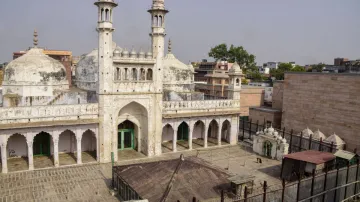In a significant development in the Gyanvapi mosque case, Allahabad High Court judge Justice Manish Kumar Nigam withdrew from hearing a plea challenging the Varanasi district court's decision regarding the Archaeological Survey of India (ASI) survey scope within the Gyanvapi mosque complex. The court has directed the matter to be referred to the chief justice for the nomination of another judge, setting January 31 as the next hearing date.
Revision petition by Rakhi Singh, plaintiff in Shringar Gauri worshipping suit
Rakhi Singh, one of the plaintiffs in the ongoing Shringar Gauri worshipping suit before the Varanasi district court, filed a revision petition. Her plea, rejected on October 21, 2023, emphasized the necessity of surveying the 'wazukhana' area, excluding the 'Shivling,' to determine the religious character of the property in question.
District court's rejection and apex court's order
The Varanasi district judge, in rejecting Singh's application, pointed to the apex court's order from May 17, 2022. This order mandated the protection of the area where the 'Shivling' is claimed to be found. Consequently, the district judge argued against directing the ASI to survey the area, citing potential violations of the Supreme Court's order.
ASI's detailed scientific survey order
On July 21 of the previous year, the Varanasi district court issued a directive to the ASI, tasking them with a "detailed scientific survey" to ascertain whether the mosque adjacent to the Kashi Vishwanath temple was constructed atop a temple. This comprehensive survey included excavations wherever necessary to delve into the historical context of the contentious site.
Historical context and hindu activists claims
At the heart of the Gyanvapi mosque case are assertions by Hindu activists who contend that a temple stood at the site centuries ago, only to be demolished in the 17th century under the orders of Mughal emperor Aurangzeb. These historical claims add layers of complexity to the ongoing legal proceedings.
The recusal of Justice Manish Kumar Nigam and the upcoming hearing on January 31 underscore the intricate legal challenges surrounding the Gyanvapi mosque case, contributing to the broader discourse on the intersection of history, religion, and the law.
Also read | Gyanvapi case: Hindu, Muslim sides to get access to ASI survey report, rules Varanasi court
